Chatting with TJ Albertson about his character in Andorra
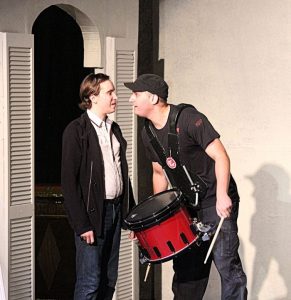 On stage for a final weekend at the Laboratory Theatre of Florida is Andorra by playwright Max Frisch. Set in a fictional European country that resembles Switzerland, the Lab chose this timeless piece of dramatic literature to observe Holocaust Remembrance Month.
On stage for a final weekend at the Laboratory Theatre of Florida is Andorra by playwright Max Frisch. Set in a fictional European country that resembles Switzerland, the Lab chose this timeless piece of dramatic literature to observe Holocaust Remembrance Month.
It’s a terrific choice.
The play focuses on a young man by the name of Andri who was putatively rescued from a country that persecuted Jews by a kindly Andorran teacher who raised the boy as his own. But now, 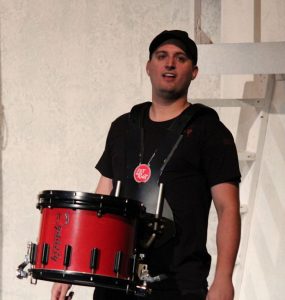 forces are afoot that render Andorra equally unsafe for people of Jewish descent. The country is being taken over by the “black shirts” to the north who intend to eradicate Andorra’s Jewish population through an initiative resembling Reichsmarshal Hermann Goring and SD Head Reinhard Heydrich’s infamous “final solution to the Jewish problem” in the territories within the German sphere of influence in Europe.
forces are afoot that render Andorra equally unsafe for people of Jewish descent. The country is being taken over by the “black shirts” to the north who intend to eradicate Andorra’s Jewish population through an initiative resembling Reichsmarshal Hermann Goring and SD Head Reinhard Heydrich’s infamous “final solution to the Jewish problem” in the territories within the German sphere of influence in Europe.
As these machinations inexorably unfold, the good citizens of Andorra subject Andri to their own form of anti-Semitism 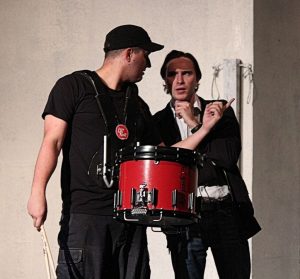 by projecting upon the hapless young man a myriad of stereotypical character traits and attributes, robbing the boy of his own identity, preventing him from achieving his innate potential, and precluding him from effectively assimilating into Andorran society. While their casual anti-Semitism has a profound and devastating effect on Andri and themselves, it is a soldier by the name of Pieter who displays the most blatant, aggressive and demeaning behavior toward Andri.
by projecting upon the hapless young man a myriad of stereotypical character traits and attributes, robbing the boy of his own identity, preventing him from achieving his innate potential, and precluding him from effectively assimilating into Andorran society. While their casual anti-Semitism has a profound and devastating effect on Andri and themselves, it is a soldier by the name of Pieter who displays the most blatant, aggressive and demeaning behavior toward Andri. 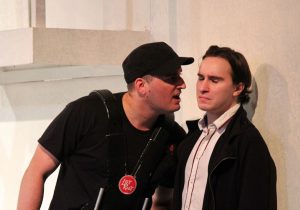 Within the context of the play, he functions as a metaphor for extremism and state-sponsored anti-Semitism. But when you understand his mental make-up and motivations, he is a chillingly accurate embodiment of the bearers and desk murderers who killed 6 million Jews during the Holocaust and who perpetrate genocide elsewhere in the world, both in the past and in the present.
Within the context of the play, he functions as a metaphor for extremism and state-sponsored anti-Semitism. But when you understand his mental make-up and motivations, he is a chillingly accurate embodiment of the bearers and desk murderers who killed 6 million Jews during the Holocaust and who perpetrate genocide elsewhere in the world, both in the past and in the present.
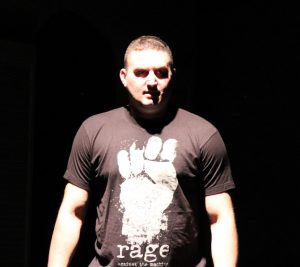 “The best way to describe Pieter is that he’s somebody who was lost and has found his identity in the military,” observes TJ Albertson, who overpowers both his cast mates and the audience with his seething, villainous portrayal of The Soldier. “Pieter is not capable of thinking for himself. He very much relies on his superiors to tell him how to think, and he regurgitates their thoughts as his own. He passes these ideas off as his own, and he believes that everyone else should adopt that same mentality.
“The best way to describe Pieter is that he’s somebody who was lost and has found his identity in the military,” observes TJ Albertson, who overpowers both his cast mates and the audience with his seething, villainous portrayal of The Soldier. “Pieter is not capable of thinking for himself. He very much relies on his superiors to tell him how to think, and he regurgitates their thoughts as his own. He passes these ideas off as his own, and he believes that everyone else should adopt that same mentality. 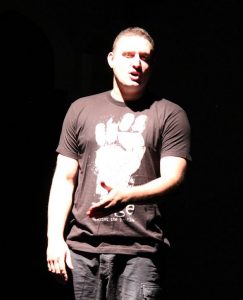 So that’s who Pieter is as a person.”
So that’s who Pieter is as a person.”
While Pieter clearly acts like the schoolyard bully in various scenes throughout the play, he’s driven more by a sense of military propriety and decorum than personal vindictiveness.
“It is this military way of thinking and acting that motivates Pieter more than anti-Semitism, per se,” Albertson agrees. “There are some instances where you see that anti-Semitism come forth, but that’s because that’s the culture of Andorra and its military. But I think if his superiors had ordered him to round up Catholics instead of Jews, he would turn the gun on them and order them to get in line.”
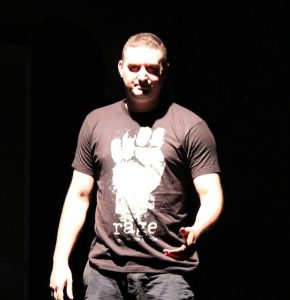 In so stating, Albertson puts his finger on a sobering truth. Men like Adolf Eichmann and Franz Stangl were neither sadistic nor perverted. They were neither psychopathic nor asocial. To the contrary, they were “terribly and terrifying normal.” But they, and the thousands of their minions who faithfully and unquestioningly executed the final solution, possessed an infinite capacity to subvert and repress their own moral compass in derogation to patriotism, country and the “greater good.”
In so stating, Albertson puts his finger on a sobering truth. Men like Adolf Eichmann and Franz Stangl were neither sadistic nor perverted. They were neither psychopathic nor asocial. To the contrary, they were “terribly and terrifying normal.” But they, and the thousands of their minions who faithfully and unquestioningly executed the final solution, possessed an infinite capacity to subvert and repress their own moral compass in derogation to patriotism, country and the “greater good.”
“[T]to murder millions … it is enough to be a loyal follower eager to 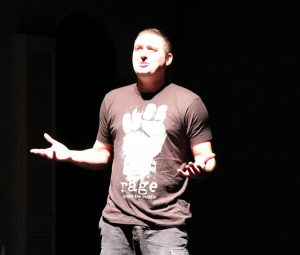 do one’s duty …” writes Alan Levy in The Nazi Hunter. “[M]ass murderers need not be – indeed, cannot be! – asocial. On the contrary, mass murder on a large scale presupposes a social conformist … These people were often good family men, good fathers. They gave to the poor. They loved flowers. But they killed people. Why? Because they had the idea that they did not need to think. Hitler would think for them. Not one was born a murderer.”
do one’s duty …” writes Alan Levy in The Nazi Hunter. “[M]ass murderers need not be – indeed, cannot be! – asocial. On the contrary, mass murder on a large scale presupposes a social conformist … These people were often good family men, good fathers. They gave to the poor. They loved flowers. But they killed people. Why? Because they had the idea that they did not need to think. Hitler would think for them. Not one was born a murderer.”
With 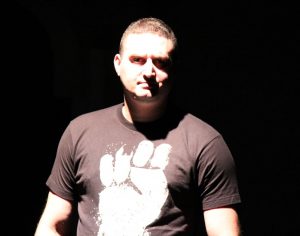 perceptive direction from Lab Artistic Director Annette Trossbach, Albertson’s portrayal of Pieter provides a window into the psyche of this type of unquestioning, blindly loyal patriot.
perceptive direction from Lab Artistic Director Annette Trossbach, Albertson’s portrayal of Pieter provides a window into the psyche of this type of unquestioning, blindly loyal patriot.
“Pieter’s motivation is following orders, and doing what he needs to do in order to look good in the eyes of his superiors,” Albertson sagely conveys. “This is the standard for honor, and that’s what Pieter needs to do to the best of his ability.”
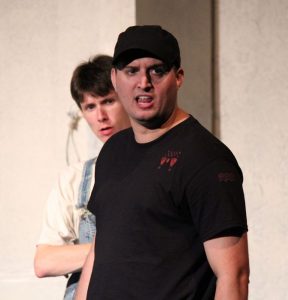 It’s also what he expects of the people under his command, whether they’re soldiers or citizens. They need to do what they are told and let others do the thinking for them.
It’s also what he expects of the people under his command, whether they’re soldiers or citizens. They need to do what they are told and let others do the thinking for them.
Of course, understanding this aspect of his character and portraying him in a way that resonates with both cast mates and the audience are two entirely different matters. Toward the end of the play, there’s a scene where the people of Andorra have been lined up in the plaza for inspection by the Jew Detector. Pieter become angry and frustrated when, paralyzed by fear, the citizens fail to carry out his directives.
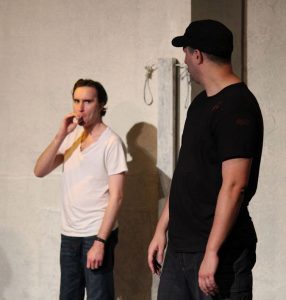 “It is easy as an actor to make a decision when playing a role like this to go over the top,” Albertson points out. “I wanted to find that line and wrestle it to the ground because it is a very intense show and very intense moment. That’s why you see Pieter vacillate between shouting at and then trying to console the townspeople.
“It is easy as an actor to make a decision when playing a role like this to go over the top,” Albertson points out. “I wanted to find that line and wrestle it to the ground because it is a very intense show and very intense moment. That’s why you see Pieter vacillate between shouting at and then trying to console the townspeople.
At first, he barks orders at them, instructing them to walk across the square. When no one moves, he shouts, “What’s the matter? All you have to do is walk across the square.” When the townspeople are still too 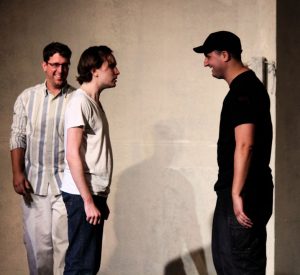 frightened to move, he tries to reassure them and assuage their fears. “No Andorran has anything to fear,” he soothes. But even that fails to get them moving, adding even more to Pieter’s growing frustration. It’s a powerful example of how someone who’s given to letting someone else do their thinking can neither understand nor accept when those subject to his control desire to think for themselves.
frightened to move, he tries to reassure them and assuage their fears. “No Andorran has anything to fear,” he soothes. But even that fails to get them moving, adding even more to Pieter’s growing frustration. It’s a powerful example of how someone who’s given to letting someone else do their thinking can neither understand nor accept when those subject to his control desire to think for themselves.
The same climate exists today, when many seem all too willing, 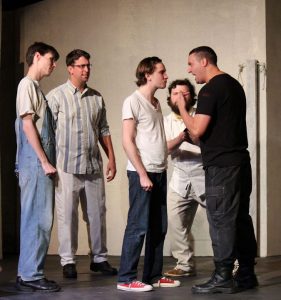 even eager, to give over responsibility for their own thoughts and actions to someone else who will do their thinking for them.
even eager, to give over responsibility for their own thoughts and actions to someone else who will do their thinking for them.
“What I think people are taking away from the show is how institutionalized anti-Semitism and racism were at the time,” Albertson nods circumspectly. “But what I hope audiences take away from the show is how institutionalized anti-Semitism and racism are now. You can draw a lot of lines and similarities to how we treat a number of different groups today. I hope [Andorra] induces audiences to take a serious look at what’s happening 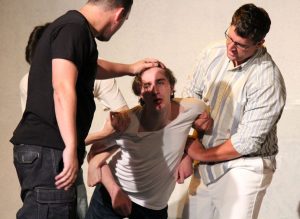 today and how many different groups are being disenfranchised in the same way as Andri was in the show.”
today and how many different groups are being disenfranchised in the same way as Andri was in the show.”
Perhaps Andorra will encourage people to reflect upon their own willingness to be led by the nose politically, socially and morally and the responsibility they must exercise in a democracy for their decisions they make and those that are made on their 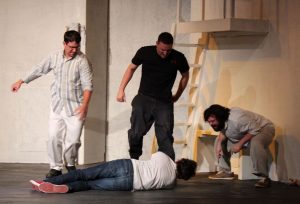 collective behalf by their political leaders.
collective behalf by their political leaders.
April 11, 2019.
RELATED POSTS.
- Lab’s ‘Andorra’ all about the message
- Confronting blatant and casual prejudice, ‘Andorra’ still relevant (sad to say)
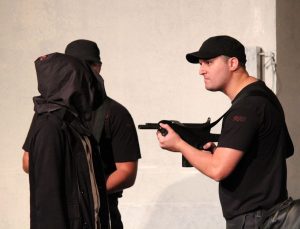 ‘Andorra’ play dates, times and ticket info
‘Andorra’ play dates, times and ticket info- Spotlight on ‘Andorra’ actor Steven Coe
- Spotlight on ‘Andorra’ actor Rob Green
- Spotlight on ‘Andorra’ actor Danica Murray
- Spotlight on ‘Andorra’ Innkeeper Cantrella Canady
- Spotlight on ‘Andorra’ Mother Heather McLemore Johnson
- Spotlight on ‘Andorra’ village idiot Kayleigh O’Connell














 Tom Hall is both an amateur artist and aspiring novelist who writes art quest thrillers. He is in the final stages of completing his debut novel titled "Art Detective," a story that fictionalizes the discovery of the fabled billion-dollar Impressionist collection of Parisian art dealer Josse Bernheim-Jeune, thought by many to have perished during World War II when the collection's hiding place, Castle de Rastignac in southern France, was destroyed by the Wehrmacht in reprisal for attacks made by members of the Resistance operating in the area. A former tax attorney, Tom holds a bachelor's degree as well as both a juris doctorate and masters of laws in taxation from the University of Florida. Tom lives in Estero, Florida with his fiancee, Connie, and their four cats.
Tom Hall is both an amateur artist and aspiring novelist who writes art quest thrillers. He is in the final stages of completing his debut novel titled "Art Detective," a story that fictionalizes the discovery of the fabled billion-dollar Impressionist collection of Parisian art dealer Josse Bernheim-Jeune, thought by many to have perished during World War II when the collection's hiding place, Castle de Rastignac in southern France, was destroyed by the Wehrmacht in reprisal for attacks made by members of the Resistance operating in the area. A former tax attorney, Tom holds a bachelor's degree as well as both a juris doctorate and masters of laws in taxation from the University of Florida. Tom lives in Estero, Florida with his fiancee, Connie, and their four cats.